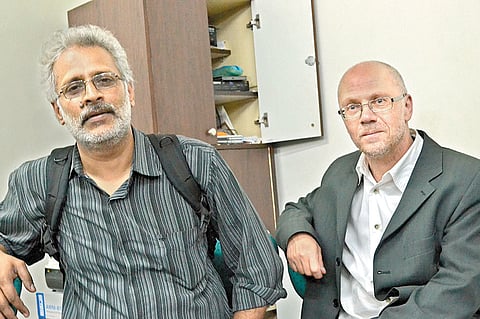

For more than six decades, there have been several short films and documentaries on nuclear issues that could not be screened due to political pressure.
The International Uranium Film Festival, which is currently on in the city, has provided a platform to screen these films to the public.
Shri Prakash and Norbert Suchanek, who were behind the Uranium Film Festival, spoke to City Express about their ideas and work.
“The documentaries will speak for people from marginal sections and urge the government to negotiate with them on the issues,” said Shri Prakash.
A native of Jharkand, Shri Prakash was born in a family of farmers.
Holding a Science degree, he was known for his expertise in audio-visual medium. He decided to make documentaries to create awareness on various issues such as mining problems and tribal displacements.
“Those days, there were many problems such as separate Statehood, construction of dams and displacement of tribals. But the problems were not exposed due to political pressures. I decided to voice for them through my documentaries. At that time, Uranium mining was a major threat to the tribal people of Jadugoda. My film ‘Buddha Weeps in Jadugoda’ explains in detail the issue,” said Prakash.
The film was screened in the year 1999 and garnered the attention of many.
“Following that, in 2009, the International Physicians for the Prevention of Nuclear War (IPPNW), which won the Nobel Peace Prize in 1985, carried out a study in Jadugoda to know the effects of radiation on people. The study was conducted by its Indian chapter, Indian Doctors for Peace and Development (IDPD), and based on this study, I directed a nine-minute film Jadugoda – The Black Magic,” he added.
It is to be noted that this film was shortlisted for ‘Yellow Oscar Award’ last year. In 2004, he received the ‘Nuclear Free Future Award’, along with Jharkandi Organisation Against Radiation, which supported Shri Prakash in both the films.
“A couple of years ago, I visited the Uranium mining spots in New Mexico and Africa. Based on that experience, I just completed my next project,” he said.
Brazilian Norbert Suchanek, who worked as an environmental journalist for 20 years, said, “If you are an investigative journalist, you will automatically land in nuclear issues, because all political issues are connected to it.”
After leaving his job, he started to make documentaries on Uranium. His film ‘Uranium Thirst’ grabbed a lot of attention from the people when it was first released in 2010.
“When I first came into documentary-making, I found that there are many environmental film festivals, which screened films that talked about the dangers of plastics, etc. There were no platforms to screen films on nuclear issues. This encouraged me to hold a separate film festival in which nuclear-related films alone can be screened,” he said.
“In 2006, at the World Uranium Summit at New Mexico, Arizona, I met Shri Prakash and since we had the same perceptions, we shared our ideas of film festival and thus the Uranium Film Festival was born,” he added.
He further said, “Every year, we need more and better films. So, we have invited entries from the directors all over the world for our third session, which will be commencing this May.”